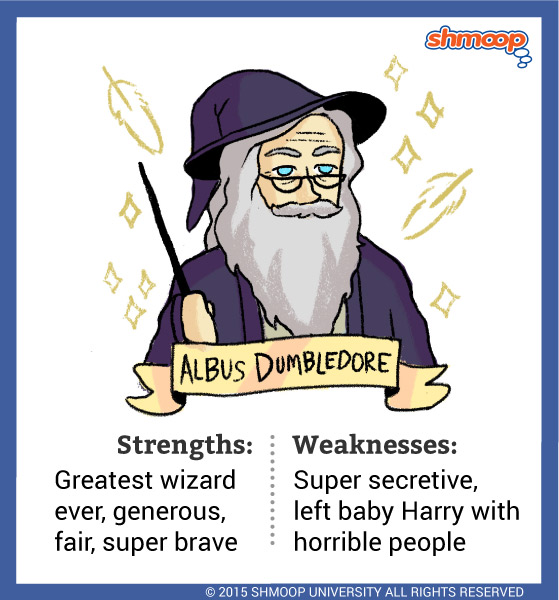Character Analysis

(Click the character infographic to download.)
Dumbledore is the headmaster of Hogwarts School of Witchcraft and Wizardry and pretty much the coolest wizard around. In this first book of the series, we see him as a friendly, but distant authority figure. While we readers first meet him as the wise, sorrowful figure who says Harry must be left with the Dursleys for his own good, Harry first learns about Dumbledore through his biography on a Chocolate Frog card (Chocolate Frogs are a delicious kind of wizard candy). According to the card, he's interested in music and bowling. He also figured out ways to employ the blood of dragons. Dumbledore really made a name for himself when he conquered a dark wizard named Grindelwald in the 1940s. The card also says that Dumbledore is "[c]onsidered by many the greatest wizard of modern times" (6.181).
Dumbledore may be a celebrity in the wizarding world, but he also has a kind and humble heart. His speeches to the Hogwarts student body show that he's a good-humored guy. On top of that, he's pretty levelheaded. It's a great thing that Hogwarts has such an even-tempered guy running the show, since things get kind of crazy around there with all gossiping ghosts and ferocious plants. Dumbledore is really patient with the hormonal teenage shenanigans at the school, which are, of course, even crazier than at most schools, because the students have magical powers.
Dumbledore's especially kind to Harry, looking out for him in the ways a cool uncle/grandpa might. We find out that he's the one who gave Harry his father's invisibility cloak. He's also the one who gives Harry such good advice about both the Mirror of Erised and the power love can have. When he comforts Harry, he's sensitive enough to let him have his cry, and he knows when to lighten the mood by chatting about Every Flavor Beans. He encourages Harry to question and learn, but also cautions him that some kinds of knowledge must be grown into.
Dumbledore is described as the most powerful "good" wizard in this book and, as result, he's basically the exact opposite of the evil Voldemort. Dumbledore's models for the students how magic can be used for good in the world. We get the sense that he's almost too cool to be Headmaster of Hogwarts – he's a genius of Einstein proportion. After all, he's such a powerful person (in terms of both the magic he knows and the advice he gives) that other powerful wizards must often encourage him to take up high-ranking (high-paying) leadership positions. It's refreshing, then, to see this kind of powerful figure care so much about educating young minds and training future generations of the wizarding world.
While Dumbledore seems to be happy and content, we're not always sure. When other characters look into the Mirror of Erised, we know what they see – Harry his family, Ron hero status – but while he know Dumbledore has looked, we don't know what he found there. When Harry asks him what he sees in the mirror, Dumbledore says he sees "thick, woolen socks" (12.199). As we, and Harry, later figure out, this reply "might not have been quite truthful" (12.202). Harry just assumes that Dumbledore lies to him about what he sees in the mirror because it is none of Harry's (a lowly first year) beeswax. Harry doesn't really think anymore about what Dumbledore really sees in the mirror. But we're left to wonder, what is Dumbledore's heart's desire? Like the majority of the Hogwarts faculty, Dumbledore has no spouse or family to speak of, no activities outside the school. We see him as the first years do, terribly old and wise, and we're shut out from any answers to what might be missing in his life.